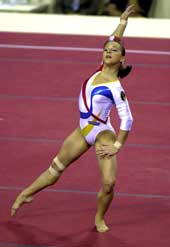 |
| RADUCAN: ‘I do not trust adults’ |
Debrecen (Hungary): A radiant smile lit Andreea Raducan’s face when she left the Sydney SuperDome on a warm September evening during the 2000 Olympic Games, being hailed as the next Nadia Comaneci.
A few hours later, the elfin 16-year-old’s dream win turned into a nightmare when it was revealed that she had failed a drugs test and was stripped of the sport’s most coveted title, Olympic all-around champion.
The first Romanian since Comaneci at the 1976 Montreal Games to claim the all-around gold, Raducan was on the cusp of super-stardom until it was announced she had tested positive for pseudo-ephedrine after taking Nurofen, an over-the-counter medicine, to treat a cold.
Despite the episode leaving her shattered, Raducan was determined not to let the incident cut short her career and showed her mettle by leading Romania to the world championship team title in Ghent last year and also won gold on the balance beam and floor.
But two years on from Sydney, Raducan is set to end her daily routine of tumbling and vaulting after the 2002 world championships, which begin on Wednesday.
Along with Russian pin-up Svetlana Khorkina, Raducan remains the main draw in women’s gymnastics. But the 19-year-old decided to quit before she was surpassed by the next generation of prodigies.
Fitness struggle
Her decision was probably instigated by her struggle to stay fit. Adrian Stoica, the Romanian Gymnastics Federation’s general secretary, said last month that Raducan wanted to end her career with a flourish even though she weighed four kilos more than her ideal weight.
“Raducan badly wants to compete successfully at the world championships because this competition will be her last as a performer,” Stoica said.
Overweight or not, the Romanian proved that she was still the one to beat on the beam when she put in a dazzling display on the four-inch piece of wood to win the title at the Glasgow Grand Prix three weeks ago.
Whatever the outcome this weekend, it is unlikely to wipe out the memories of Sydney.
“I do not trust any adults,” Raducan recently said with steely resolve, referring to the Romanian team doctor who prescribed the cold remedy.
“What happened in Sydney was not my fault so I can only look ahead and concentrate on my immediate goals,” added the fearless competitor, who was allowed to keep the team gold and silver she won on the vault during the Olympics.
Although Raducan received worldwide sympathy for her disqualification after the IOC acknowledged that the drug gave her no competitive advantage, it provided little consolation to the gymnast.
She had inadvertently been catapulted into the same league as Canadian Ben Johnson, who topped the list of sporting con artists after he was stripped of his 100 metres gold following a positive test for steroids at the 1988 Seoul Games.
It is unfortunate that while her idol Comaneci will be remembered as the first gymnast to score a perfect 10, Raducan will go down in sporting history as the first Olympic gymnast to test positive for a banned substance.
But unlike her predecessors in the Olympics roll of drug users, Raducan is more likely to be remembered as a gymnast who was cheated out of a gold medal by an ignorant team doctor rather than a gymnast who cheated to win the title at all costs.
Having been robbed in Sydney of the title she had trained for since the age of seven, Raducan is guaranteed to receive a rousing send-off from the Hungarian fans.










